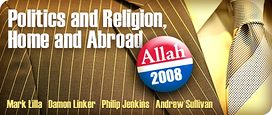I offer this initial contribution, focusing on the essays by Damon and Andrew.
I wholeheartedly agree with most of Andrew’s analysis, not least when he says that “America is substantively and experientially a deeply religious country, and its political discourse has always been saturated with religious rhetoric and imagery.” Historically too, he may well be right in stressing the role of a secular Constitution in preventing the establishment of unsavory theocratic regimes. If he will excuse the phrase, God bless the Constitution. Damon is also right to stress the religious quality that pervades the thought-world of many Americans, educated or otherwise: “millions of their fellow citizens are perfectly comfortable making theological assumption about the political foundations of the nation, its principles, and its institutions.”
Where I disagree with both, perhaps, is in their portrayal of the religious politics of the past few years as anything unusual or sinister, even as the irruption of some kind of alien force. Debate about American religious politics concentrates on images of the Religious Right, Moral Majority, Theocons etcs, when it should more properly try to comprehend the whole spectrum of political theologies, left, right and center.
Let me suggest this: we complain about the influence of religion in politics only when that leads to ideological conclusions that we do not like. In the 1960s, for instance, I don’t think there were too many complaints about the massive religious content of the Civil Rights movement. In the 1980s, when people complained about “religion in politics”, even incipient theocracy in the United States, what they had in mind was the Moral Majority and its like, and not the political theologies of the Left. I am thinking of the potent strain of Catholic liberalism and pacifism that was so evident in campaigns against nuclear weapons, and against U.S. intervention in Central America. When I say that, I am not complaining about the right of Catholic authorities to speak out on issues they believe to be morally critical. However, that intervention was neither more nor less proper than the activities of the Falwell-Robertson crowd. Americans are a deeply religious people, and it is only natural that they should frame their political and social ideologies in religious terms.
In other words, the verb conjugates as follows:
I speak from moral concern.
You drag religion into politics.
He is a theocrat.

